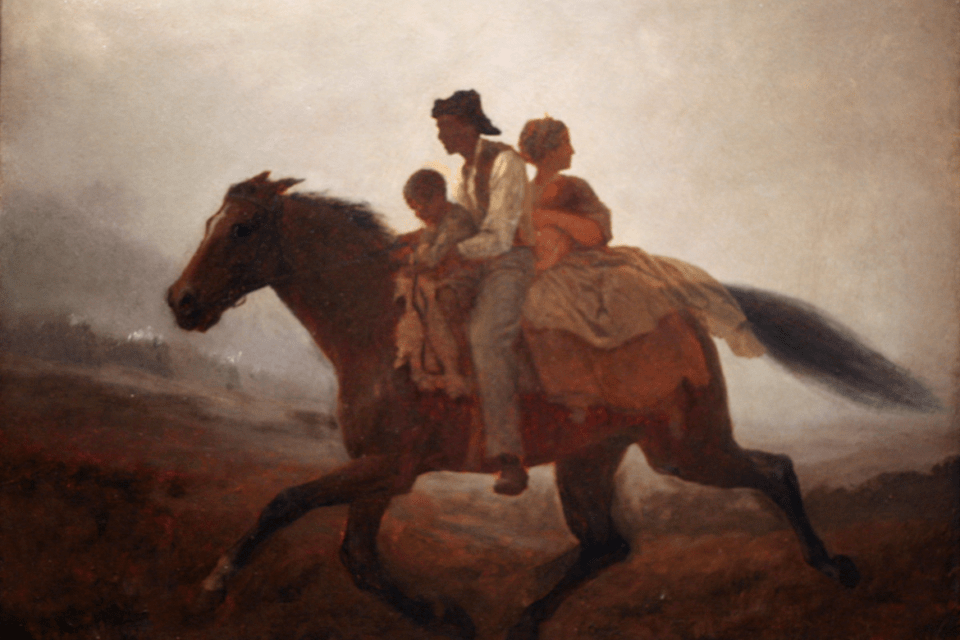Eastman Johnson (American, 1824-1906). A Ride for Liberty — The Fugitive Slaves (recto), ca. 1862.
The day before Juneteenth, 2020, Senator John Cornyn announced his intention to introduce legislation aimed at making it a federal holiday. He called it, on the Senate floor, “an opportunity to reflect on our history, the mistakes we have made, but yet how far we’ve come in the fight for equality, and a reminder of just how far we still have to go”.
Juneteenth commemorates the end of slavery, pegging it’s date not to the de jure dates of the Emancipation Proclamation or the 13th amendment, but the de facto day that Gen. Gordon Granger brought Lincoln’s order to slaves in Texas which had never heard of their freedom, years after it was promised to them by a distant federal government.
It has been celebrated by many in black communities for over a hundred and fifty years, and is recognized by nearly all states since Texas codified it in 1980. It is a symbol of liberation, liberty, and freedom, and a recognition that all men were created equal, even as our history has struggled to make our founding promises a reality.
It would instantly become one of our nation’s most important and deserving federal holidays, and one of the few that seems actually justifiable.
One might question whether or not federal holidays should exist (or assuming they should, how many we should officially stack on our calendar). However, for the moment let’s just stack it up to it’s existing competition to see if such a holiday is worthy of our current and existing standards.
January 1st is New Year’s Day, celebrating nothing of note other than one more year Earth has made it around the sun. It celebrates, essentially, just the passage of time that is already implicitly acknowledged by the Gregorian calendar itself on which it’s based… and maybe the hope for a new start that most people inevitably squander as their new gym memberships lapse before February and diets give way to renewed gluttony. You and I may benefit from being able to drink our way into a new day without being penalized for our hangover the next day at work, but in terms of what it celebrates, well… it’s essentially a linear view of time rather than a concept worthy of celebration.
There are several holidays that deify people rather than their ideas, even if those people are best known for them. If we are to view people, historically, as what they are or were, rather than symbols, saints, or absolute sinners? Holidays modeled after specific individual people rather than the ideas they’ve advanced is a mistake.
For instance, most Americans rightly love MLK, but there’s nothing stopping us from having a Civil Rights Day rather than an MLK Day. Washington may have been a badass, but we’ve got Washington’s main contribution covered with the 4th of July, really. Columbus Day is offensive to some for obvious reasons. Christmas Day has the federal government celebrating a specific religion and the person of Jesus. The language of our Constitution could be read to oppose this, and it being done by the state could violate some basic founding principles. It definitely seems opposed to modern conceptions of the separation of church and state.
Maybe it’s apostasy towards tradition, but there’s a case to be made that it’s better to celebrate ideas or even events than people for federal holidays.
Memorial Day honors the sacrifice of our soldiers in conflicts fought since the time of the Civil War. It presumes that the sacrifice of these soldiers—primarily brave men and women fighting for what they believed—was not taken in vain and advanced the causes which underpinned the official justification of these wars.
Certainly, some of these conflicts necessitated such a sacrifice, and regardless of the righteousness of the cause, the willingness to die for one’s beliefs is absolutely admirable. Unfortunately, a good case can be made that many of these honorable, laudable, brave soldiers died in vain or for a cause that was unnecessary – or a lie. Many of these soldiers are victims themselves of an immoral system glorified by such parades and holidays that pretend themselves to be in their honor in order to recruit more fodder. Many of the wars America has fought since the Civil War had nothing to do with our freedoms, were mistakes, and do not deserve recognition as a matter of national pride on their own.
Labor Day is the slightly more moderate cousin of May Day, mirroring a cause promoted primarily by socialist and communist parties and individuals to commemorate not just the Haymarket Affair, but their own un-American ideologies. Granted, it’s a step removed and there have been domestic gains made by unions divorced from such toxic ideologies, but to many it will forever be tainted by it’s association, regardless of the contributions of “labor” in the abstract. Today, it is often viewed merely as an end of summer—but it’s radical history still remains.
Recently, Columbus Day has become the most contentious federal holiday, with many localities replacing it entirely with Indigenous People’s Day or dropping it alltogether. Opposition to the holiday was originally championed by the Know Nothings and the Ku Klux Klan as an occasion which celebrated the immigration of Catholics, especially from Ireland and Italy. However, in recent times, opposition has instead focused on how Europeans had treated the indigenous populations, with charges leveled of literal genocide. It is easily the least popular federal holiday, and the one most likely to offend modern sensibilities. Similarly, Thanksgiving has recently come under fire both for it’s association with whitewashing what Europeans did to the American indigenous population, and because of it’s religious roots.
Should we add Juneteenth as a federal holiday? Well, by the standards and precedents of the existing holidays, it would be an improvement over much of what is currently observed.
Juneteenth could showcase America’s national character as one that is constantly improving in the direction of liberty for all and equality of opportunity advocated by our admittedly hypocritical founders. Juneteenth showcases that the ideal of America advocated at our nation’s beginning has evolved and expanded—or been more perfected—as well as the hope that we can achieve ever greater gains towards a better world despite the sins of our fathers and the continued inadequacies of our modern world that many are just now noticing.
When the ideal of America and the state of the nation of America come into conflict, we should promote our ideals. The abolition of slavery is the greatest gain towards ‘liberty for all’ that America has ever achieved.





3 comments
… [Trackback]
[…] Read More on to that Topic: thelibertarianrepublic.com/a-better-national-holiday-juneteenth-celebrates-the-ideals-of-america/ […]
… [Trackback]
[…] Read More on that Topic: thelibertarianrepublic.com/a-better-national-holiday-juneteenth-celebrates-the-ideals-of-america/ […]
… [Trackback]
[…] Find More Information here to that Topic: thelibertarianrepublic.com/a-better-national-holiday-juneteenth-celebrates-the-ideals-of-america/ […]